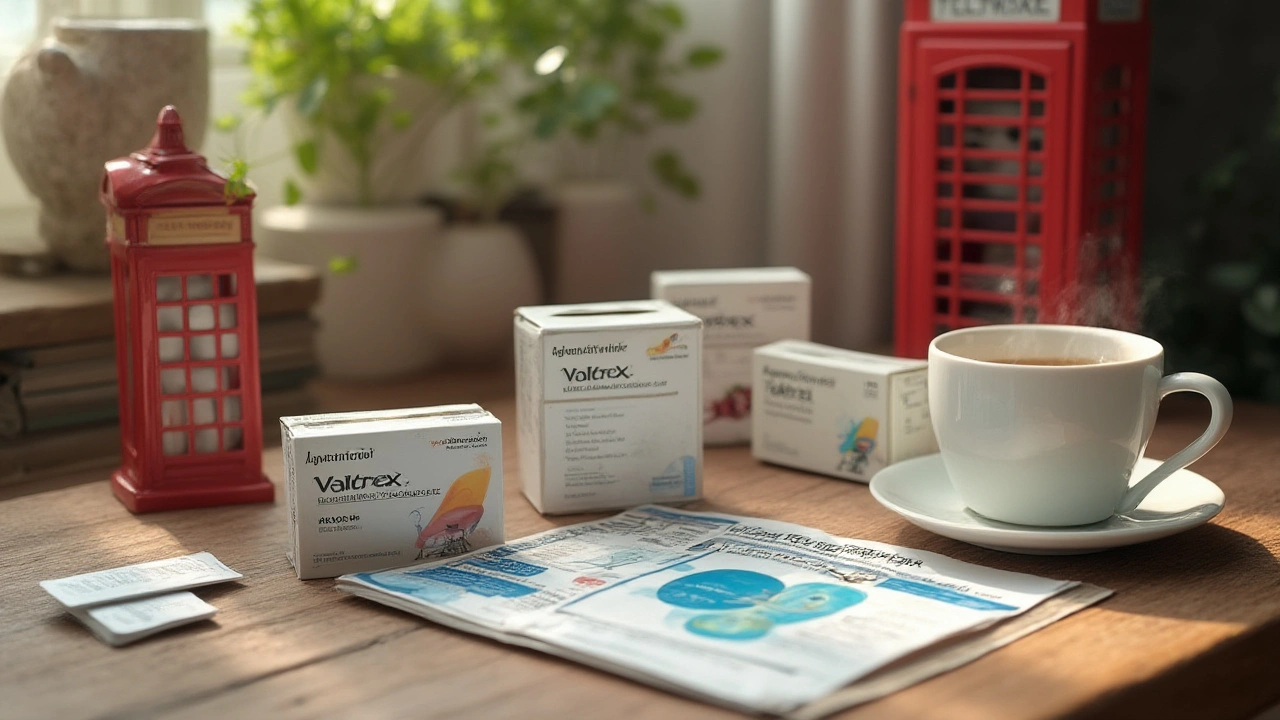19 Jul 2025
- 7 Comments
Picture this: your doctor prescribes Valtrex for a virus, but then pauses when your test results flag kidney problems. Suddenly, medication takes on a new complexity. Kidney function shapes which drugs your body can handle, and when it comes to something as common as herpes treatments, people with kidney issues face some tricky decisions. Mismanaged dosing isn’t just uncomfortable; it can land you back in hospital—something nobody wants on their bingo card. Surprisingly, almost 10% of people in Australia have chronic kidney disease according to Kidney Health Australia. That’s a chunk of the population who need safer, smarter antiviral options.
Kidneys and Antivirals: Why Standard Dosing Can Be Risky
Antiviral drugs like Valtrex (valacyclovir) do a great job knocking back viral outbreaks—from cold sores to shingles and genital herpes. Valtrex works by blocking viral replication, putting much-needed brakes on outbreaks. The twist? The drug relies heavily on your kidneys to exit your system. With kidney disease or any drop in kidney function, drugs can stick around longer, raising the risk of side effects. Too much Valtrex in your bloodstream won’t give you superpowers—just a long list of possible headaches: vomiting, confusion, and in severe cases—something called neurotoxicity, where your brain goes haywire. It’s not a risk worth taking.
Doctors adjust antiviral dosing using something called the eGFR (estimated glomerular filtration rate), which shows how well kidneys are filtering blood. A healthy eGFR is 90 or above, but even the 60s can signal mild to moderate disease. Once you dip below that, most drug leaflets flag a red warning. Here’s what gets wild: Valtrex’s usual adult dose for herpes zoster (shingles) is 1,000mg three times a day. For those with severe kidney impairment, that might drop all the way down to 500mg just once a day, or even every other day — a massive cut. But people don’t always know their numbers, and some GPs miss the kidney connection if no warning is flagged. One UK review found that 17% of patients prescribed antivirals didn’t get a safe dose for their kidney level.
Let’s talk numbers. Check out the table below for typical adjustments recommended for valacyclovir:
| eGFR (mL/min) | Standard Adult Dose | Adjusted Dose |
|---|---|---|
| >50 | 1000mg x 3/day | No change |
| 30-49 | 1000mg x 3/day | 1000mg x 2/day |
| 10-29 | 1000mg x 3/day | 1000mg x 1/day |
| <10 | 1000mg x 3/day | 500mg x 1/day |
It seems simple, but even the best plans go out the window if you don’t know your kidneys are slowing down. That’s why regular bloodwork matters. If you’re not sure about your eGFR, a quick chat with your GP will clear it up. Even if you’re feeling great, silent kidney trouble can sneak up on you.

Tried and Tested: Alternative Antivirals for Kidney Patients
So what happens if Valtrex just isn’t a good fit? The good news: It isn’t your only move. There are multiple antivirals on the market, each with their pros, cons, and kidney-related trade-offs. The two most common alternatives to valacyclovir are acyclovir and famciclovir. Still, you need to know how they stack up—because they’re all cleared through your kidneys at different rates.
First up, acyclovir. It’s the grandparent of herpes antivirals, discovered way back in the late 1970s. It’s given in smaller, more frequent doses than Valtrex, and is famous for its safety record. But (and it’s a big but), it still needs serious dose slashing as your kidney function dips. For example, someone with healthy kidneys might take 800mg five times a day for a bad shingles outbreak. Drop kidney function below 10 mL/min, and that shrinks to just 800mg every 12 to 24 hours. Even the gentlest option can build up fast in failing kidneys.
Famciclovir is the next contender. Its popularity is growing because the dosing is usually straightforward, and it might cause fewer side effects like nausea. Still, it isn’t magic: the dose needs to change as kidney numbers fall. For example, for an outbreak of genital herpes, the standard is 250mg three times per day. If your eGFR is under 40, doctors slash that to 125mg twice daily. It’s all about balancing effectiveness with safety—too small a dose, the virus isn’t controlled. Too much, you risk mental changes and wonky blood counts. The sweet spot is tricky to hit without a tailored plan.
Here’s the thing few people talk about: Not all antivirals are created equal, and not every GP is a kidney specialist. If you ask for acyclovir, famciclovir, or even ganciclovir, be prepared to have your eGFR checked and repeat the test regularly. The dose you need today may be too much a year from now. If you’re already on dialysis, things get even trickier, because antivirals can build up between sessions.
There’s also a handful of lesser-known options, like foscarnet and cidofovir, reserved for serious viral infections—not the basic cold sore. These are usually used in hospital, not pharmacy prescriptions, and require strict kidney monitoring every few days. While rare, they’re a backup plan for viruses that won’t quit or for patients with complicated immune problems.
If you want the deep dive—side effects, rare meds, and practical tips—check out this handy guide on Valtrex alternatives. And here’s a small but crucial tip: always tell your healthcare team about every pill you’re taking. Over-the-counter stuff, herbal supplements, and even big multivitamins can mess with kidney function or interact with antivirals. Grapefruit juice, for example, packs a punch with how your liver handles meds, while NSAIDs like ibuprofen can quietly jab at your kidney power.

How to Work With Your Doctor: Dosage, Monitoring, and Self-Advocacy
Doctors love a patient who asks smart questions. If you have kidney issues and need treatment for herpes, shingles, or chickenpox, bring your recent lab results to your appointment. Ask: “Does my kidney function change my antiviral dose?” If your doctor hesitates or doesn’t know your latest eGFR, push for a quick blood test. Every guideline for valacyclovir, acyclovir, or famciclovir includes a bold section on renal impairment—this isn’t rare, it’s common, yet patients still fall through the cracks.
Here are a few practical ways to stay proactive:
- Keep a copy (digital or paper) of your latest kidney blood tests.
- When you pick up a script for antivirals, double-check the dose—especially if your pharmacy has changed.
- Speak up about new side effects, even if they seem small. Feeling foggy, seeing strange visions, or having weird muscle twitching can signal your kidneys are struggling with the med.
- Stay hydrated. Dehydration tanks your kidney function on a dime and makes drug toxicity more likely.
- Remember that your body weight counts, too—dosing is often based on weight as well as kidney function, especially for those who are significantly heavier or lighter than average.
Don’t forget, you’re the common factor in your care team, and you know how your body reacts better than anyone. One fascinating study in the Journal of Antimicrobial Chemotherapy found that when patients were trained to ask their doctor about drug safety—as simple as saying, “Is this safe for my kidneys?”—hospital visits dropped by 30% over two years. Sometimes just opening your mouth saves a ton of grief.
Tech can help, too. Many labs let you check your bloodwork online. Set reminders to follow up with your GP, and don’t toss those test slips—save them for future doctor visits. Most phone apps let you snap a pic of your results and store them securely. This little trick keeps everything in one place, so you never have to scramble for answers mid-consult.
Let’s face it, nobody grows up dreaming of grappling with kidney disease. But modern medicine gives you a fighting chance, especially when you steer your own care. If Valtrex isn’t the answer, there are other solid options—just stick close to your kidney numbers, loop in your doctor, and never settle for the “standard” dose when your body is writing its own rulebook. You don’t have to put your life on pause or take unnecessary risks; there’s a way forward that protects your kidneys without letting the virus win.


katerine rose
July 24, 2025OMG I had no idea Valtrex could wreck your brain if your kidneys are slow. My aunt got hospitalized after taking it for shingles and they said it was 'drug toxicity' but no one explained why. Now I check her eGFR before she even fills any script. Also stop taking ibuprofen if you're on antivirals-she did and it was a disaster. Save yourself the ER trip.
Selma Cey
July 25, 2025It's ironic how we treat viruses like enemies but ignore the fact that our own organs are the real gatekeepers. The body isn't a machine with interchangeable parts-it's a living negotiation. Valtrex isn't the villain, it's just a guest who overstayed because we didn't check the door. Maybe the real question isn't 'what's safer?' but 'why do we keep forcing drugs into broken systems instead of healing the system?'
Francis Pascoe
July 26, 2025My GP gave me the full Valtrex dose even though my eGFR was 38. I got confused, hallucinated, and thought my cat was talking to me. I didn't say anything because I thought it was 'just stress.' Two days later I was in ICU with acute renal failure. They had to dialyze me just to flush the damn drug out. If your doctor doesn't know this, fire them. This isn't medical advice-it's a warning from someone who almost died because someone didn't read a damn table.
Richa Shukla
July 27, 2025lol this is all a big pharma scam to sell more tests. They want you to believe your kidneys are broken so you keep buying meds. I took acyclovir for 3 years with eGFR 42 and felt fine. They just want you to panic and get blood work every month. Also, grapefruit juice is a government plot to control your liver. 🤡
Chris Rowe
July 28, 2025So you're tellin me after all this time, the real problem ain't the virus... it's the kidneys? Wow. I thought it was just 'take pill, feel better.' Now I gotta remember numbers, drink water, check apps, and not eat grapefruit? Man, I just wanna pop a pill and forget about it. But okay, sure, I'll go get my eGFR tested... after I finish this beer.
Sushmita S
July 29, 2025My mom took famciclovir and said she felt like her brain was in slow motion 😥 I told her to stop and now she's on acyclovir but at half dose. She still gets outbreaks but at least she’s not dizzy all day. Plz check your numbers ppl 🙏
AnneMarie Carroll
July 30, 2025You people are missing the point. This isn't about dosing charts or kidney numbers-it's about systemic neglect. Doctors are overworked, pharmacies don't verify, and patients are treated like data points. I've seen this happen three times in my family. Someone gets a script, doesn't question it, and ends up in renal failure. The real alternative isn't acyclovir-it's demanding accountability. If your doctor doesn't bring up renal function, they're not doing their job. Stop being passive. Your kidneys aren't optional.